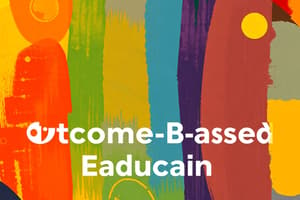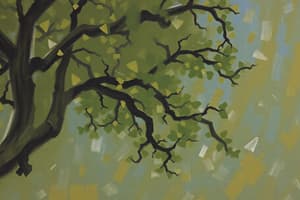Podcast
Questions and Answers
What motivated New-First- Hammer- Maker to change the customary ways of his tribe?
What motivated New-First- Hammer- Maker to change the customary ways of his tribe?
- An ambition to document his knowledge for future generations
- The desire to lead the community with authority
- A deep dissatisfaction with existing tribal methods (correct)
- The need to create competition among tribe members
Which activity did New-First introduce to children as a formal part of their development?
Which activity did New-First introduce to children as a formal part of their development?
- Catching fish with bare hands (correct)
- Building shelters with natural resources
- Developing artistic skills through painting
- Creating tools for hunting
What is the outcome of New-First's introduction of activities related to adult survival in children's play?
What is the outcome of New-First's introduction of activities related to adult survival in children's play?
- The community became more competitive with others
- The community began to prosper and thrive (correct)
- Children rejected the adult-led curriculum
- Life became more complicated for the tribe
How did New-First view the traditional education practices of his community?
How did New-First view the traditional education practices of his community?
Which of the following best describes New-First's characteristics that made him an educated man?
Which of the following best describes New-First's characteristics that made him an educated man?
What role did New-First play in the integration of play into the educational curriculum?
What role did New-First play in the integration of play into the educational curriculum?
What term would best describe the curriculum activities introduced by New-First?
What term would best describe the curriculum activities introduced by New-First?
What is the main purpose of assessment for learning?
What is the main purpose of assessment for learning?
What significant change did New-First inspire within his community through his curriculum development?
What significant change did New-First inspire within his community through his curriculum development?
What behavioral change is an example of learning?
What behavioral change is an example of learning?
Which of the following can be considered a hidden curriculum?
Which of the following can be considered a hidden curriculum?
How does learned curriculum demonstrate higher order skills?
How does learned curriculum demonstrate higher order skills?
What factors contribute to the formation of a hidden curriculum?
What factors contribute to the formation of a hidden curriculum?
What is the role of a curricularist in education?
What is the role of a curricularist in education?
Which type of assessment focuses on determining what has been learned?
Which type of assessment focuses on determining what has been learned?
In which scenario might a teacher be most affected by hidden curricula?
In which scenario might a teacher be most affected by hidden curricula?
What main change in the environment affected the community's ability to catch fish?
What main change in the environment affected the community's ability to catch fish?
What innovative solution did the community come up with to address their fishing problems?
What innovative solution did the community come up with to address their fishing problems?
How did the wise old men in the tribe view the suggestion to change the education system?
How did the wise old men in the tribe view the suggestion to change the education system?
Which animal's population decline posed a significant challenge for the community?
Which animal's population decline posed a significant challenge for the community?
What is described as the essence of true education?
What is described as the essence of true education?
What does the concept of curriculum encompass in modern education?
What does the concept of curriculum encompass in modern education?
What was the perception of curriculum in the 19th century compared to today?
What was the perception of curriculum in the 19th century compared to today?
What would happen to classrooms if there were no curriculum?
What would happen to classrooms if there were no curriculum?
Flashcards
Curriculum
Curriculum
The planned learning experiences and activities designed to achieve educational goals.
Teacher as Curricularist
Teacher as Curricularist
A teacher actively involved in developing and implementing the curriculum, tailoring it to the needs of learners.
Different Curricula in Schools
Different Curricula in Schools
Various approaches to learning, covering different subjects and educational levels.
Curriculum Development
Curriculum Development
Signup and view all the flashcards
Educational Goals
Educational Goals
Signup and view all the flashcards
Learning Experiences
Learning Experiences
Signup and view all the flashcards
New-First-Hammer-Maker
New-First-Hammer-Maker
Signup and view all the flashcards
Community Needs
Community Needs
Signup and view all the flashcards
Curriculum - 19th Century
Curriculum - 19th Century
Signup and view all the flashcards
Curriculum - 21st Century
Curriculum - 21st Century
Signup and view all the flashcards
Curriculum: Core of Teaching
Curriculum: Core of Teaching
Signup and view all the flashcards
Curriculum - Timelessness?
Curriculum - Timelessness?
Signup and view all the flashcards
Curriculum - Adaptability
Curriculum - Adaptability
Signup and view all the flashcards
Curriculum - Stern Opposition
Curriculum - Stern Opposition
Signup and view all the flashcards
Curriculum - Mere Training?
Curriculum - Mere Training?
Signup and view all the flashcards
Assessed Curriculum
Assessed Curriculum
Signup and view all the flashcards
Learned Curriculum
Learned Curriculum
Signup and view all the flashcards
Hidden Curriculum
Hidden Curriculum
Signup and view all the flashcards
How does the assessed curriculum differ from the learned curriculum?
How does the assessed curriculum differ from the learned curriculum?
Signup and view all the flashcards
What role can teachers play in addressing the hidden curriculum?
What role can teachers play in addressing the hidden curriculum?
Signup and view all the flashcards
Why is it important for teachers to be aware of all curriculum types?
Why is it important for teachers to be aware of all curriculum types?
Signup and view all the flashcards
What qualities make a good 'curricularist'?
What qualities make a good 'curricularist'?
Signup and view all the flashcards
Why is the teacher's role as a 'curricularist' crucial?
Why is the teacher's role as a 'curricularist' crucial?
Signup and view all the flashcards
Study Notes
Curriculum in Schools
- Curriculum is the organized body of knowledge, skills, and experiences presented in schools.
- It's found in all forms of education (formal, non-formal, and informal).
- Without curriculum, classrooms would be empty, and teachers would have nothing to teach.
Types of Curricula
-
Recommended Curriculum: Broad guidelines set by educational agencies (DepEd, CHED, TESDA) for curriculum content and structure. This includes policies, standards, and recommendations.
-
Written Curriculum: More detailed documents based on the recommended curriculum. This includes syllabi, modules, lesson plans, and course outlines.
-
Taught Curriculum: The actual curriculum put into practice. This is influenced heavily by the teacher's teaching style and the learners' abilities.
-
Supported Curriculum: Resources like books, materials, labs, and facilities that support the learning process.
-
Assessed Curriculum: The process of evaluating learning outcomes through assessments, and can be for learning, as learning or of learning.
-
Learned Curriculum: The actual knowledge, skills, and behaviors acquired by the learner. This represents how successful the learning experience was.
-
Hidden/Implicit Curriculum: Unintentional lessons learned from the school environment, peer influences, culture, and societal influences.
The Teacher as a Curricularist
- A curricularist is a curriculum specialist involved in curriculum development, implementation, evaluation, and innovation
- They are aware of the multiple types of curricula
- A teacher has multiple roles in supporting, implementing, and evaluating curriculum.
Curriculum Development Process
- Curriculum development involves planning, writing, initiating, innovating, implementing, and evaluating.
- Planning includes identifying learning goals, determining the appropriate content, and considering time constraints.
- Implementation focuses on using the curriculum effectively through appropriate teaching methods and resources.
- Evaluation assesses the effectiveness of the learning and determines if adjustments are needed.
Studying That Suits You
Use AI to generate personalized quizzes and flashcards to suit your learning preferences.




